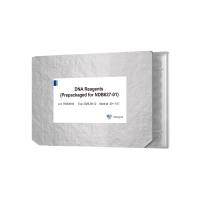Use of PCR in Library Screening: An Overview
互联网
493
Traditionally, libraries are screened with different probes to isolate target genes or sequences. These probes can be a particular sequence such as a cDNA, a polymerase chain reaction (PCR) product, or a genomic fragment (1 ). An oligonucleotide can be a probe if no closely related cDNAs or gene clones are available to use, or if only the amino acid sequence of a protein from a gene is available and the gene sequences can be derived by reverse-translating (2 ,3 ). Sequences derived from mRNA can also be used as a probe to identify gene sequences according to the differences in their concentrations from different biological sources (1 ). In addition, antibody probes can also be used to isolate cDNA clones for target proteins (4 ). However, using cDNA, PCR product and gene probes is limited in library screening depending on the availability of a sequence of sufficient similarity to cross-hybridize with a clone containing the target gene (1 ). In screening a library with a nucleic acid probe, plates are prepared with either bacterial colonies or with plagues from a phage library (1 ). The general screening procedure, for example, in screening cDNA in phage, includes titering the library to determine the phage concentration; plating and lifting the phage particles; hybridizing the immobilized cDNA with appropriate radiolabeled DNA probes; and selecting positive plaques by autoradiography. The procedure is usually cycled in order to isolate a plaque with a single cDNA. This procedure, however, can be time-consuming, labor-intensive, and difficult with requirements such as radiolabeling. Today, the PCR has become a significant technique in identifying and isolating positive clones from libraries. With the sensitivity and specificity of PCR technique, the advantages of PCR-based library screening can be recognized: 1.









